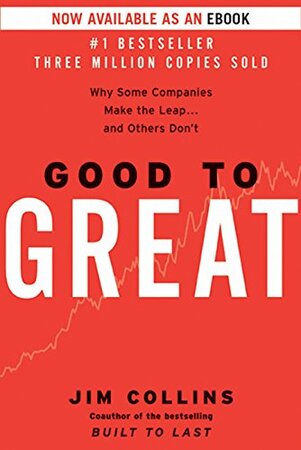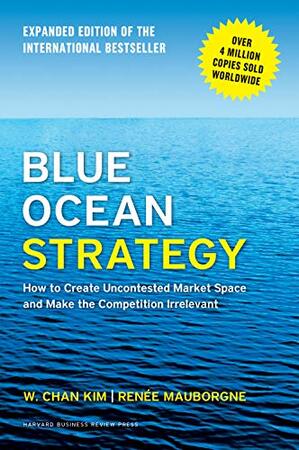
Good to great
The Research Study and Criteria for Greatness
“Good to Great” by Jim Collins is a management and leadership book that explores why some companies are able to achieve long-term greatness and sustained success, while others stagnate or fail. “The Research Study and Criteria for Greatness” in “Good to Great” by Jim Collins represents the cornerstone of the book, grounded in an extensive and meticulous research study conducted by Collins and his team. This comprehensive investigation spanned the performance trajectories of 28 companies over a span of 30 years. Through this rigorous examination, Collins endeavored to unravel the elusive factors that distinguish companies capable of achieving sustained greatness and long-term success. Notably, the companies identified as “great” were not merely those that experienced fleeting bursts of growth, but rather those that consistently outperformed their industry peers for a minimum of 15 years. This rigorous selection process ensured that the characteristics and principles identified were not transient anomalies but enduring traits indicative of exceptional performance and enduring success. By immersing themselves in this rigorous research, readers are provided with a solid foundation rooted in empirical evidence, paving the way for profound insights into the mechanisms driving sustained greatness in organizations.
Key Characteristics and Factors for Success
In addition to the key characteristics previously discussed, Collins and his team uncovered several other pivotal factors that significantly contributed to the success of great companies. These factors span various dimensions, including the critical imperative of assembling the right individuals who not only possess the requisite skills but also align closely with the company’s overarching purpose and values. Furthermore, the research underscored the paramount importance for companies to maintain an unwavering commitment to long-term sustainable growth, eschewing the allure of short-term gains in favor of enduring success. Collins also delved deeply into the concept of “technology accelerators,” elucidating how companies could strategically harness technological advancements to gain a competitive edge and foster innovation within their respective industries. Moreover, Collins extensively explored the concept of the Stockdale Paradox, drawing inspiration from the profound experiences of Admiral James Stockdale. This paradox underscores the indispensable necessity of confronting the harsh realities of a situation while simultaneously maintaining an unwavering belief in the eventual triumph over adversity. Collins accentuates the critical importance of this resilient mindset, illustrating how leaders who courageously confront challenges head-on and maintain an optimistic outlook can effectively navigate through turbulent times, adapt, and ultimately emerge stronger on their journey towards achieving greatness. Through this comprehensive exploration of key characteristics and pivotal factors, “Good to Great” offers readers profound insights and actionable strategies applicable to leaders and organizations striving to attain enduring success and greatness.
Exploring Concepts for Achieving Greatness
In “Good to Great,” Jim Collins delves into a plethora of concepts pivotal for organizations aspiring to achieve greatness, providing readers with actionable insights derived from extensive research and real-world examples. Central to his discourse is the vital role of cultivating a culture of continual improvement and adaptability within organizations. This entails not only encouraging experimentation but also embracing both success and failure as invaluable learning opportunities along the path to excellence. Moreover, Collins underscores the necessity of fostering an environment that prioritizes innovation and growth, recognizing these as essential components of sustained success. Through compelling case studies and practical examples drawn from diverse industries, Collins vividly illustrates how real-world companies have successfully implemented these concepts to catalyze transformative changes within their organizations, ultimately propelling them towards sustained greatness. By distilling these principles into actionable insights, “Good to Great” equips readers with the tools and strategies necessary to navigate the complexities of organizational growth and unlock their full potential on the journey toward greatness.
The Path to Greatness and Conclusion
In “Good to Great,” Jim Collins presents a seminal work that provides readers with a comprehensive roadmap for navigating the complex journey toward long-term success in the business world through meticulous research and a rich tapestry of real-world examples. Collins distills a treasure trove of invaluable insights and actionable strategies, empowering readers to embark on their own paths to greatness. At the core of Collins’ discourse are foundational principles, including disciplined decision-making processes, where great companies exhibit a consistent approach guided by clear criteria and unwavering commitment to their core values. Cultivating a culture of excellence, trust, and alignment with organizational goals is essential for sustained greatness. Effective leaders inspire and guide their teams toward a shared vision, fostering commitment and resilience. Greatness requires adaptability—the ability to evolve and thrive in response to shifting market dynamics and technological advancements. By synthesizing these key elements, “Good to Great” not only illuminates the distinguishing factors that set great companies apart but also equips leaders and aspiring leaders with the knowledge and tools necessary to emulate their success. Armed with this profound understanding, readers can chart a course toward sustained greatness for their organizations, ensuring a prosperous and impactful future in the dynamic realm of business.













